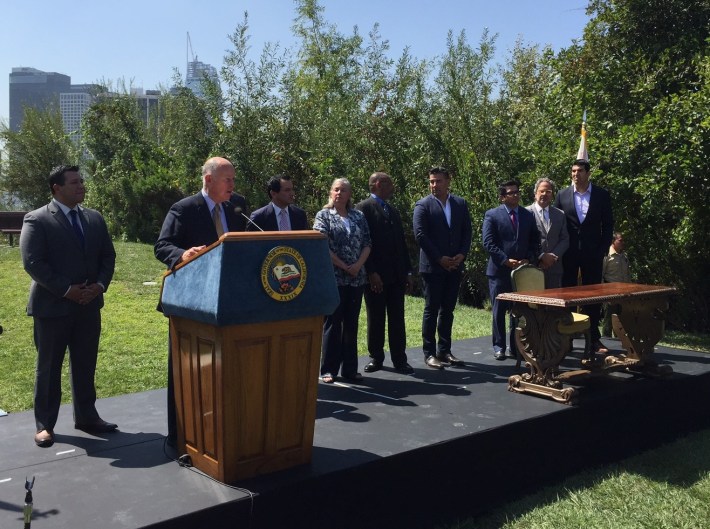
In a signing ceremony at Vista Hermosa Park in Los Angeles today, Governor Jerry Brown signed legislation extending state climate change targets through at least 2030. The governor was joined by key legislators who shepherded the legislation's approval. These included Senate President Pro Tempore Kevin De Leon, Assembly Speaker Anthony Rendon, Senator Fran Pavley, Assemblymember Eduardo Garcia, Senator Ricardo Lara, and assemblymembers Reggie Jones-Sawyer, Jimmy Gomez, Richard Bloom, and Matt Dababneh.
The governor officially approved S.B. 32 and A.B. 197. S.B. 32 sets targets for greenhouse gas emission reductions, while A.B. 197 creates more oversight and requirements for the Air Resources Board, the agency in charge of defining and regulating emission reduction methods. These bills are expected to enable the state to continue and strengthen the state's cap-and-trade programs, which fund transit capital, transit-oriented affordable housing, high-speed rail, and other programs designed to reduce harmful emissions.
In a hard-fought battle this summer, where commentators asserted that the state's cap-and-trade program was dead, senate and assembly leaders secured last minute approval for this critical legislation.
Though Governor Brown did not call out big oil by name this time, he made clear today that this approval had been "a fight" against "the biggies" who pressed to defeat these "far-sighted and far-reaching" bills.
To some extent, today's ceremony represented a changing of the guard for California climate change leadership. Senator Pavley, who led efforts to create the state's initial climate change regulations in 2006, spoke of the history of California's successful past efforts to limit greenhouse gases. Pavley, who represents the west San Fernando Valley, western L.A. County, and eastern Ventura County, is termed out of the senate. Pavley acknowledged the new generation of younger environmental leaders, especially embodied by Eduardo Garcia. Garcia, who represents the Coachella Valley, acknowledged the importance of Pavley's leadership, and went on to speak of the importance of environmental legislation addressing disparities by improving the health and well-being of people of color living in economically distressed communities.





